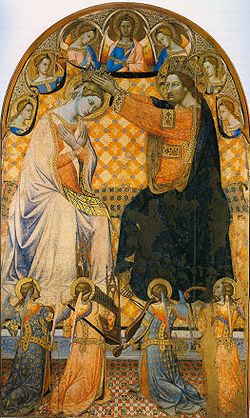
Back Coronació de Maria Catalan Korunování Panny Marie Czech Krönung Mariens German Kronado de la Virgulino Maria Esperanto Coronación de la Virgen Spanish Maarja kroonimine Estonian تاجگذاری باکره Persian Couronnement de la Vierge French Corónú na Maighdine Beannaithe ins na Flaithis Irish Mária megkoronázása Hungarian
The Coronation of the Virgin Mary in Heaven | |
|---|---|
 | |
| Litany of Loreto by Pope Sixtus V (1587): Queen of Angels and All Saints, Queen assumed into Heaven Pope Pius XII (1954): Queen of Heaven Second Vatican Council (1964): Queen of the Universe (Lumen Gentium, Section #59) | |
| Venerated in | Roman Catholic Church |
| Feast | May 31st (until 1968) August 22nd (present) |
| Attributes | Mary crowned in Heaven by Jesus or jointly with God the Father, surrounded by Cherubim and/or Saints |

The Coronation of the Virgin or Coronation of Mary is a subject in Christian art, especially popular in Italy in the 13th to 15th centuries, but continuing in popularity until the 18th century and beyond. Christ, sometimes accompanied by God the Father and the Holy Spirit in the form of a dove, places a crown on the head of Mary as Queen of Heaven. In early versions the setting is a Heaven imagined as an earthly court, staffed by saints and angels; in later versions Heaven is more often seen as in the sky, with the figures seated on clouds. The subject is also notable as one where the whole Christian Trinity is often shown together, sometimes in unusual ways. Crowned Virgins are also seen in Eastern Orthodox Christian icons, specifically in the Russian Orthodox church after the 18th century. Mary is sometimes shown, in both Eastern and Western Christian art, being crowned by one or two angels, but this is considered a different subject.
The subject became common as part of a general increase in devotion to Mary in the Early Gothic period, and is one of the commonest subjects in surviving 14th-century Italian panel paintings, mostly made to go on a side-altar in a church. The great majority of Roman Catholic churches had (and have) a side altar or "Lady chapel" dedicated to Mary. The subject is still often enacted in rituals or popular pageants called May crownings, although the crowning is performed by human figures.